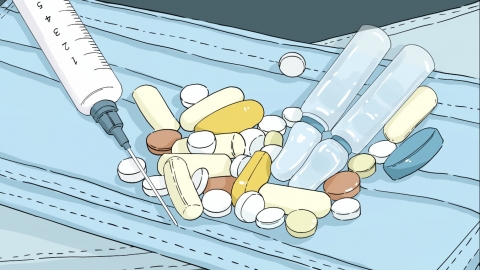Which medications may cause low platelet counts in newborns?
Generally, neonatal thrombocytopenia may be triggered by various factors. Some medications can lead to this condition by affecting platelet production or accelerating platelet destruction. Commonly implicated drugs include Vancomycin Hydrochloride Injection, Cefotaxime Sodium for Injection, Rifampin Capsules, Indomethacin Enteric-coated Tablets, and Sulfadiazine Tablets. Detailed explanations are as follows:
1. Vancomycin Hydrochloride Injection
Vancomycin hydrochloride belongs to the glycopeptide class of antibiotics. In neonates, its use may suppress bone marrow hematopoietic function, reduce megakaryocyte production, and subsequently lead to insufficient platelet generation, causing thrombocytopenia. This drug is commonly used to treat severe gram-positive bacterial infections in neonates, but complete blood count must be closely monitored to avoid long-term or excessive administration.
2. Cefotaxime Sodium for Injection
Cefotaxime sodium for injection is a third-generation cephalosporin antibiotic. Some neonates may be sensitive to this drug, potentially triggering immune-mediated platelet destruction. The drug may act as a hapten, binding to platelets and inducing antibody production that attacks platelets, resulting in a decrease in platelet count. Clinicians should monitor changes in neonatal platelet counts during treatment and adjust medication promptly if abnormalities occur.

3. Rifampin Capsules
Rifampin capsules are commonly used in treating diseases such as tuberculosis in neonates. The drug may interfere with the bone marrow hematopoietic microenvironment, inhibiting megakaryocyte proliferation and differentiation, thereby reducing platelet production. Since neonates have immature liver and kidney function and limited drug metabolism capacity, dosage must be strictly controlled, and complete blood count should be regularly reviewed to monitor platelet levels.
4. Indomethacin Enteric-coated Tablets
Indomethacin enteric-coated tablets belong to the class of nonsteroidal anti-inflammatory drugs (NSAIDs). In neonates, this medication may inhibit prostaglandin synthesis, thus affecting platelet aggregation function. Additionally, in some cases, it may impair bone marrow hematopoietic function, indirectly leading to decreased platelet production. It should be used under medical guidance in short courses and at low doses, with regular monitoring of platelet counts.
5. Sulfadiazine Tablets
Sulfadiazine tablets are sulfonamide antimicrobial agents. After administration in neonates, the drug may affect folate metabolism, as folate is an essential component for megakaryocyte maturation. Folate deficiency can lead to impaired megakaryocyte development and reduced platelet production.
During medication, neonates must strictly follow medical instructions, avoiding self-administration of drugs. Complete blood count, especially platelet count, should be regularly monitored during treatment. If thrombocytopenia is detected, timely communication with the physician is necessary to adjust the treatment plan, ensuring the health of the neonate.




